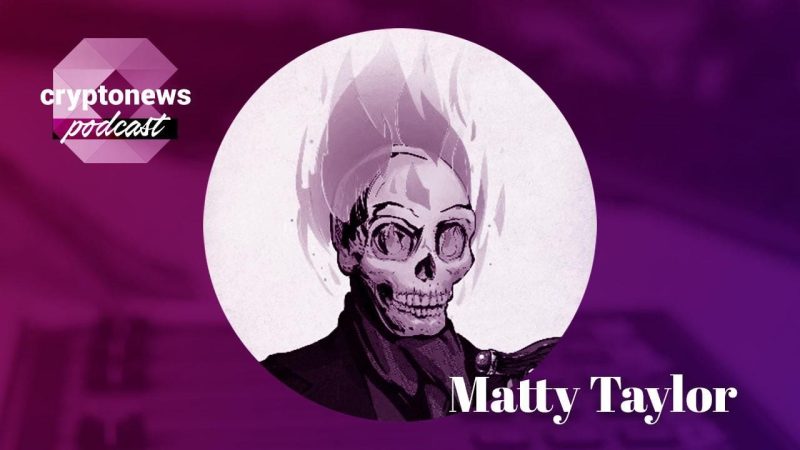Dramatic showdown looms in South Korea as Yoon faces impeachment trial and possible arrest
Matty Taylor, Co-founder of Colosseum, on Solana, Hackathons, and Growing the Solana Ecosystem | Ep. 314


In an exclusive interview with Cryptonews, Matty Taylor sat down with Cryptonews Podcast host Matt Zahab to discuss Colosseum, the independent organization he co-founded.
He talked about growing the Solana ecosystem, accelerating its adoption, and how the Solana Foundation hackathons help accomplish just that.
In this interview, Taylor discussed:
Colosseum as a platform focused on growing, accelerating, and investing in the Solana ecosystem;
Colosseum streamlining three pillars: hackathon, accelerator, and venture fund;
Colosseum’s aim to onboard the next generation of on-chain developers and make decentralized technologies as ubiquitous as email;
Bonk DAO making a first-of-its-kind investment in Colosseum to back ecosystem builders;
hackathons as the backbone of the Solana developer community, attracting $600m in venture funding for the winners.
You can watch the video above to learn what Matty and Matt talked about – or you can read a part of it below.
Not the Y Combinator of Solana
The team announced the launch of Colosseum in late January this year. The organization aims to run Solana’s hackathons, accelerate winning founders, and invest in crypto startups.
Many have described it as “essentially Y Combinator (YC) for Solana.”
The comparison comes due to the organization’s aim to sponsor and nurture promising startups.
Taylor commented that the Colosseum team is flattered by the comparison and that they have a lot of work to do “to lift up to that sort of legacy.”
However, he said,
“Honestly, long-term, we don’t really want to be compared to Y Combinator, because we think we have a very differentiated model on what we’re trying to do. This is specifically built for the crypto industry and Solana in particular.”
While one can think of Colosseum as a traditional accelerator, like YC, there is no written application. Instead, projects must win a five-week hackathon to be even considered for the program.
Taylor argued that this model is “a much better indicator of potential founder and founding team talent” than a traditional written application.
Therefore, Colosseum will run hackathons that the team has been doing for the past three years at the Solana Foundation.
Besides hackathons, they have added two more pillars to the organization: the accelerator and a venture fund.
The funds raised will be given to the hackathon winners. Up to fifteen teams per hackathon will be accepted into the Accelerator program and will receive a pre-seed $250,000 investment each.
Colosseum will continue to support them and help them go from DevNet to Mainnet, where they can sufficiently pitch seed investors and raise a proper venture fundraising round.
Two Touch Points with Solana
Asked if Colosseum is directly involved with the Solana Foundation, Taylor explained that it is, in fact, a fully independent organization.
However, there are two particular touchpoints between the two.
Firsts: The Solana Foundation is a liquidity provider (LP) in the Colosseum’s venture fund. They have invested in the fund itself and have signed a commercial agreement for Colosseum to “take the reins” in administering their official hackathons.
Second: Colosseum is focused on Solana “just generally.” The team feels “very strongly” that most of the growth of applications and the ecosystem around them will happen on Solana over the next several years.
And so, Taylor said,
“We’ve basically decided to focus all of our efforts on that particular ecosystem.”
This approach also helps the team modify the accelerator experience to help embed the projects in this ecosystem rather than going multi-chain and “diffusing the experience across many different L1 or L2 ecosystems.”
Moreover, Taylor commented that we are still early in crypto’s evolution – and hence, Solana’s evolution.
That said, Solana’s Mainnet went live just four years ago, in March 2020. “There’s a ton of room for growth left,” Taylor said.
Therefore, Solana will inevitably get to the next level of adoption, he argued.
Taylor added that “we’re seeing the fruits of that right now, where the developer ecosystem and founder ecosystem is stronger than ever, hackathon submissions are at all-time highs.”
Renaissance is On
Colosseum recently announced the start of the next hackathon with the Solana Foundation, called Renaissance.
It will run from March 4 through April 8.
“It should be pretty big,” Taylor said.
Today, the Solana Renaissance Hackathon officially kicks off!
Tomorrow March 5 at 10am PST join an X Spaces AMA with @SolanaFndn & @ColosseumOrg to learn how to better position yourself for success.
Set reminders & drop your questions in advance in thread below! https://t.co/z5jsvrMGtx
— Solana (@solana) March 4, 2024
This will be the first hackathon where the team will choose winners and then select a subset of those winners to join the accelerator program. These will receive the funding.
More specifically, there will be 30-40 winners in the first round. These will then proceed to have an interview with the three Colosseum co-founders.
The second round of evolution will determine the top 10-15 teams that the organization will invest in.
“And hopefully, this will usher in the next wave of breakout startups in the Solana ecosystem,” Taylor said.
Interested projects can sign up now.
Renaissance will also show the level of interest in the Solana ecosystem, but based on the activity on the Colosseum platform, “we think it’s stronger than ever.”
BONK DAO’s Surprising Investment
BONK DAO made a first-of-its-kind $500,000 investment in Colosseum earlier this year.
Taylor noted that the move was “pretty surprising” to the team.
But the BONK DAO Council had been looking for ways to use their treasury to help support the ecosystem. And they felt that becoming an LP in the Colosseum fund accommodates this.
The DAO held a vote on whether to invest, they voted ‘yes,’ and Colosseum accepted the offer.
Per Taylor,
“I’ve never heard of this happening before for another venture fund. So definitely uncharted waters. But we’re excited to help fulfill the vision that they have, which is growing the startup ecosystem on Solana and helping founders get off on the best foot.”
BONK DAO, he argued, is not your average meme coin. There seems to be a lot more actual development around it.
“It’s probably one of the most integrated tokens just into the Solana DeFi ecosystem,” Taylor noted.
As for other developments, Colosseum finds the social network space interesting.
“That’s a whole green field of opportunity that we’d love to see more experimentation with,” Taylor concluded.
__________
About Matty Taylor
Matty Taylor is the co-founder of the independent organization Colosseum. The other two co-founders are Clay Robbins and Nate Levine.
Taylor was previously the Head of Growth at the Solana Foundation, where he kickstarted the Solana hackathon program in 2020.
Over the past three years, that program cumulatively resulted in over 60,000 participants, 4,000 projects launched, and $600 million in venture funding for winners.
Top Solana ecosystem founders from Tensor, Squads, StepN, Jito, and dozens of other leading projects got their start through Solana Foundation hackathons.
Taylor previously worked at 0x Labs and Square (now Block).
The post Matty Taylor, Co-founder of Colosseum, on Solana, Hackathons, and Growing the Solana Ecosystem | Ep. 314 appeared first on Cryptonews.











